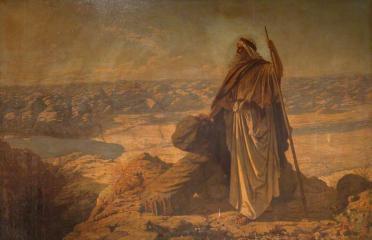Every week, parshaoftheweek.com brings you a rich selection of material on parshat hashavua, the weekly portion traditionally read in synagogues all over the world. Using both classic and contemporary material, we take a look at these portions in a fresh way, relating them to both ancient Jewish concerns as well as cutting-edge modern issues and topics. We also bring you material on the Jewish holidays, as well as insights into life cycle rituals and events...
In this week’s parsha, Pinchas, the Jewish nation is near the end of their 40-year trek in the desert, and getting ready to enter Israel. Issues of conquest and division of the land are being discussed. At this stage, the five daughters of the deceased Tzlafchad approach Moshe with a pertinent and practical question. The laws of inheritance are all about sons inheriting the property of their fathers. What about us, they ask. Our father died leaving no sons, only daughters. May we inherit his portion of the land of Israel, once we actually get there? The law is silent on this issue, what is to be done? Should we not inherit? Why should be treated worse than other citizens, other heirs?
Moshe consults with God, and gets a positive answer; yes, in such a case, the daughters are right, and they may take possession of their late father’s portion of the land.
Immediately following this story, God tells Moshe that his time is up, and that he must prepare to climb Mount Nevo, take a longing look at the promised land, which he will not enter, and die. In preparation for this, he is told to name Yehoshua as his successor.
The Rabbis, in the Midrash, ask why this dramatic communication between God and Moshe is placed here, immediately after the story of the daughters of Tslafchad? One answer is that all this talk about how to divide up the land gave Moshe the hope that perhaps his sin of hitting the rock for water had been forgiven, and that he would be allowed to enter the land and be in charge of conquering and dividing it. God therefore informed him now that, no, that was not the case, and the plan had not changed.
In the same vein, I would like to add another, somewhat different possibility. When the daughters of Tslafchad approached Moshe with their request to inherit their father’s share in the land of Israel, he, and we, learn a few things. We learn that the Jewish people, even the women (sorry, but this happened in a pre-feminist world) had come to love the land of Israel, and wanted to be there and claim it as their own. We also see that the Jewish people, even the women (sorry again), feel at home with the Torah’s legal system. They look at it, and if they see problems, questions, and missing pieces, they are unafraid to ask what is to be done. If the Torah does not deal with the laws of daughters inheriting, we need to ask Moshe a halachic question, we must find a solution. This mature, active, dynamic, questioning approach to the laws of the Torah is another piece of good news.
With this basic, long-awaited information – the Jews have finally figured out that they belong in Israel, and they understand that the Torah is a living, breathing, dynamic system - God knows that it is time for Moshe to hand the torch over to Yehoshua, as his work is finally done. He has taught the people the two great lessons they need to know, the lessons it took them forty years to learn, and which we, their heirs, must never forget – to take ownership of and responsibility for their land and their Torah – and he can now pass the reins of leadership on to Joshua and the next generation.
Shabbat Shalom



Get inspired by Pinchas Divrei Torah from previous years